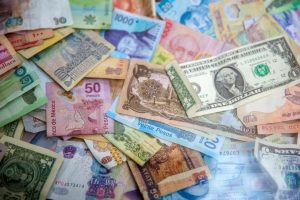Forex trading has become an increasingly popular way to make money online, and for many traders, using a forex broker is a vital part of their strategy. But have you ever wondered how much a forex broker makes from your trades? In this article, we will take a closer look at the world of forex brokers and explore their earnings.
Firstly, it is important to understand what a forex broker does. A forex broker is an intermediary between the trader and the interbank currency market. They provide traders with access to the market, allowing them to buy and sell currencies. Forex brokers earn their money from the spread, which is the difference between the buying and selling price of a currency pair. For example, if the EUR/USD currency pair has a bid price of 1.2000 and an ask price of 1.2005, the spread is 0.0005 or 5 pips. The spread is usually expressed in pips, and it represents the broker’s commission for facilitating the trade.
The spread can vary depending on the forex broker, the currency pair being traded, and market conditions. Forex brokers can offer fixed or variable spreads. Fixed spreads remain constant, while variable spreads can change depending on market volatility. Some brokers may also charge a commission on top of the spread, particularly for ECN (Electronic Communication Network) accounts.
So, how much do forex brokers make from the spread? The answer is that it varies widely. On average, forex brokers can make anywhere from $1 to $10 per standard lot traded, depending on the currency pair and the trading platform used. A standard lot is 100,000 units of the base currency, and it is the standard size for forex trading. For example, if a trader buys 1 standard lot of EUR/USD, the broker can earn anywhere from $1 to $10 from the spread.
However, it is important to note that not all trades are profitable for forex brokers. In fact, forex brokers can also lose money from the spread. This happens when the market moves against the broker, and they are left with a losing position. In this case, the broker will have to cover the losses themselves, which can eat into their profits.
Aside from the spread, there are other ways that forex brokers can earn money. One of these is through swap fees. Swap fees, also known as rollover fees, are charged when a trader holds a position overnight. This fee is based on the interest rate differential between the two currencies in the currency pair. Forex brokers can earn money from the swap fee by charging a small percentage of the position size for each day that the trade is held.
Forex brokers can also earn money through trading volume. Some brokers offer rebates or cashback to traders based on their trading volume. This can incentivize traders to trade more, which in turn can increase the broker’s earnings.
It is worth noting that forex brokers operate in a highly competitive market, and the industry is heavily regulated. Brokers need to adhere to strict regulations, including segregating client funds, and providing transparent pricing and execution. This means that forex brokers need to invest in high-quality technology and infrastructure to ensure that they can provide their clients with a reliable and efficient trading experience.
In conclusion, forex brokers can make money from the spread, swap fees, and trading volume. The amount that a forex broker can earn from the spread varies widely, and can depend on the currency pair, the trading platform used, and market conditions. It is important to choose a reputable forex broker that is regulated and transparent in their pricing and execution. As a trader, it is important to be aware of the costs involved in forex trading, including the spread, and to factor these into your trading strategy.





